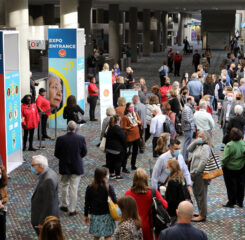As previously promised, the Biden Administration gave more than 60-days’ notice prior to the end of the Public Health Emergency on May 11, 2023. CMS is encouraging health care providers to prepare now for the end of these flexibilities and to begin moving forward to reestablishing previous health and safety standards and billing practices.
CMS also released updated fact sheets summarizing the current status of Medicare Blanket waivers and flexibilities by provider type: Hospice: CMS Flexibilities to Fight COVID-19.
We took a deeper look at the hospice fact sheets and found several items to highlight. We’ve previously reported on the workforce related timelines which members can review in detail here.
Telehealth
- Hospice Routine Home Care Telehealth: Hospice providers can provide services to a Medicare patient receiving routine home care through telecommunications technology (e.g., remote patient monitoring; telephone calls (audio only and TTY); and two-way audio-video technology), if it is feasible and appropriate to do so. Only in-person visits are to be recorded on the hospice claim. This waiver will expire at the end of the PHE.
- On May 11th, 2023 hospice agencies will no longer be allowed to utilize telehealth for routine home care visits. LeadingAge will be working with the Administration to continue this waiver beyond the PHE as they did with Home Health telehealth services as well as advocating for the inclusion of these visits on the claims, like was approved for Home Health in CY2023, to better track how access to telehealth impacts patients.
- Hospice Face-to-Face Encounter: Face-to-face encounters for purposes of patient recertification for the Medicare hospice benefit can now be conducted via telehealth (i.e., two-way audio-video telecommunications technology that allows for real-time interaction between the hospice physician/hospice nurse practitioner and the patient). The Consolidated Appropriations Act, 2023 extended telehealth flexibilities through December 3, 2024, regardless of the status of the PHE.
- LeadingAge will be working with Congress on any future extensions of this flexibility or the permanent inclusion of this flexibility in statute.
- NEW Reporting Home Address: During the PHE, CMS allowed practitioners to render telehealth services from their home without reporting their home address on their Medicare enrollment while continuing to bill from their currently enrolled location. When the PHE ends, practitioners will be required to resume reporting their home address on the Medicare enrollment.
- LeadingAge is following up with CMS on clarification of how this impacts clinicians who work on behalf of Part A settings like Hospice and are not billing for Part B services.
Quality
- Quality Assurance and Performance Improvement (QAPI): CMS has modified the requirements at 42 CFR §418.58 for Hospice, which require these providers to develop, implement, evaluate, and maintain an effective, ongoing, hospice-wide, data-driven QAPI program. Specifically, CMS modified the requirements at §418.58(a)–(d) to narrow the scope of the QAPI program to concentrate on infection control issues, while retaining the requirement that remaining activities should continue to focus on adverse events. The requirement that hospices maintain an effective, ongoing, agency-wide, data driven QAPI programs will remain. CMS will end this waiver at the conclusion of the COVID-19 PHE.
- Before May 11th, 2023 hospices that utilized this waiver will have to reevaluate their QAPI programs to ensure the programs capture all elements of 418.48(a)–(d) beyond infection control and adverse events.
- Comprehensive Assessments: CMS has been waiving certain requirements for Hospice 42 CFR §418.54 related to update of the comprehensive assessments of patients. This waiver applies the timeframes for updates to the comprehensive assessment (§418.54(d)). Hospices must continue to complete the required assessments and updates, however, the timeframes for updating the assessment may be extended from 15 to 21 days. CMS will end this waiver at the conclusion of the PHE.
- On May 11th, 2023 hospices will have 15 calendar days to update the comprehensive assessment. Hospices are advised to review their current processes and procedures to ensure consistent updates to the comprehensive assessment every fifteen calendar days. For some agencies, this may require looking at current staffing models to ensure the interdisciplinary team can meet (in collaboration with the individual’s attending physician, if any) within the required 15-day timeline to review and update the comprehensive assessment.
- Waive Non-Core Services: CMS has been waiving the requirement for hospices to provide certain non-core hospice services during the national emergency, including the requirements at 42 CFR §418.72 for physical therapy, occupational therapy, and speech language pathology. CMS will end this waiver at the conclusion of the PHE.
- On May 11th, 2023 hospices will have to ensure that they have PT/OT/SLP services available to patients. Hospices are advised to review their current processes and procedures as well as contract to ensure these services can be rendered to any patient on service.
Workforce
- Waived requirement for hospices to use volunteers: CMS has been waiving the requirement at 42 CFR §418.78(e) that hospices are required to use volunteers (including at least 5% of patient care hours). It is anticipated that hospice volunteer availability and use will be reduced related to COVID-19 surge and anticipated quarantine. This waiver will terminate at the end of the COVID-19 PHE.
- Before May 11th, 2023 hospices will have to ensure that volunteers can account for 5% of patient care hours. Hospices are advised to review their current processes and procedures and volunteer recruitment strategies. LeadingAge is working to get clarity from CMS on how surveyors will assess the 5% volunteer requirement after three years of this waiver being in place.
- NEW State Licensure: During the PHE, CMS allowed licensed physicians and other practitioners to bill Medicare for services provided outside of their state of enrollment. CMS has determined that, when the PHE ends, CMS regulations will continue to allow for a total deferral to state law. Thus, there is no CMS-based requirement that a provider must be licensed in its state of enrollment.
- On May 11th, 2023, hospice and their employed clinicans will need to defer to individual state laws on whether or not a clinican can practice outside their state of enrollment.
- Workforce Training Updates: CMS made a number of clarifications regarding when hospice agencies must come into compliance with waivers regarding workforce. LeadingAge urges its members to start preparing to do the necessary trainings and assessments in order to be back in compliance in a timely manner. LeadingAge previously reported on these changes here.

 Shutdown Week Three: Impact of Ongoing Closure on Affordable Housing
Shutdown Week Three: Impact of Ongoing Closure on Affordable Housing Colleagues on the Move, February 18, 2026
Colleagues on the Move, February 18, 2026





